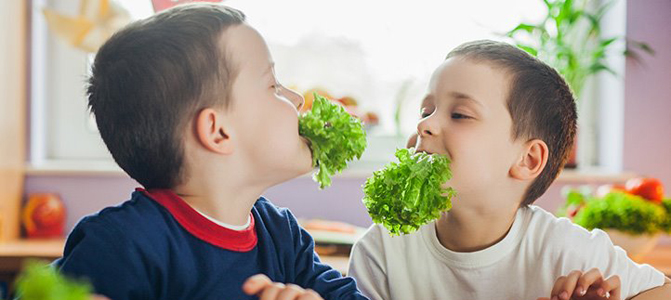
KEY TO PROPER GROWTH AND DEVELOPMENT OF CHILD
- Dr Kumar
- August 23, 2022

KEY TO PROPER GROWTH AND DEVELOPMENT OF SCHOOL CHILD.
The school age period has been called the latent time of growth. The rate of growth slows and body changes occur gradually. There is an increasing interest and participation in other activities which compete with meal times.
As children grow up, they become more independent about choosing their food. The school age child has increasing exposure to influence on food habits.
The diet should contain all form of basic five food groups. If the child does not have access to items from all food groups on regular basis, self-selection of a balanced diet either within a day or over several days is impossible. As children grows up they tend to like outside foods, junk foods. So, it is essential to build up healthy eating habits in children early, as a balanced diet is vital to ensure proper growth and development. The health and well being of our children are extremely important, not only for their lives now, but also for their futures. Good nutrition and adequate physical activity are key contribution to both health and development.
NUTRITIONAL ADVICE FOR SCHOOL CHILDREN:
- Breakfast is very important for school children. Its breaks the fast of the sleep hours and prepare a child for problem solving and memory spans in the learning period at school.
- Variety of foods should be given to children in order to have adequate nutrient intake.
- There should be balance between diet and physical activity.
- A well-balanced diet should be given which will provide enough calcium and iron to meet their growing body’s requirement.
- Snacks are an important meal of healthy diet for growing child.
- The diet should be adequate in quantity and quality of different nutrients.
- The diet should include a variety of foods.
- Their food intake will improve if the food is interesting and attractive.
- Foods should be slightly seasoned so that they taste better and the child takes it well.
- Child should never be forced to eat more than he/she can take.
- Food preferences of the child should be taken into consideration.
- Regular meal time is essential.
- Inclusion of curd every day in the diet can decrease the incidence of diarrhoea and course of cold.
FACTORS RESPONSIBLE FOR REJECTING THE FOOD BY CHILDREN
- Unfavourable comments on food,
- Repetitive food, no variety,
- Food is not according to the likings of the child,
- Food is not palatable,
- Snack taken just before the meal
- The child may be sick,
- Worm infestation particularly hook worm,
- Nutritional deficiency,
- The child is too tired,
- Insufficient time for eating,
- Psychologically disturbed
- Stress of school,
- Shifting to a new place,
- Birth of siblings,
- To draw the attention of parents
NUTRITIOUS SNACKS:
Some suggestion for nutritious snacks:
- Fresh fruits/ Fruit salad
- Sandwich,
- Natural yogurt with fruits,
- Upma,
- Soya tikka,
- Egg and vegetable pan cake,
- Aloo kalbi,
- Sprouts chat,
- Mango lassi/ banana shake
EASY AND HEALTHY TIFFINE RECIPES
- Bread upma
- Poha
- Moong dal chilla
- Chapati wraps
- Peanut chat
- Makhana chat
- Dry poha mixture
- Hung curd sandwich
- dry fruit ladoo
- Moong and jaggery ladoo
- Fruit salad
TIPS FOR ESTABLISHING A GOOD MEAL TIME ROUTINE:
- Ensure mealtimes are happy and pleasant experiences.
- Offer small portions to begin with more can be offered if needed.
- Allow children to decide when they have eaten enough and don’t push them to clear their plate.
- Encourage self-feeding as much as possible.
- Never leave young children unsupervised at meal times.
- Accept mess as part of normal feeding and development process.
- Praise toddler when they eat well.
- Don’t force feed a child.
- Keep calm and patient.
HEALTH ISSUES RELATED TO IMPROPER NUTRITION:
Poor nutrition during childhood can lead to all sorts of problem later in life, such as an increased risk of:
- Obesity
- Hypertension
- Diabetes
- Coronary heart disease
- Anemia
- osteoporosis
FOOD HYGIENE AND SAFETY:
Children under 5 years are vulnerable to food poisoning and can become very ill very quickly, so it is important to store, prepare and cook food safely for them.
Some tips to remember when preparing foods for young children:
- Wash all fruits and vegetables before eating.
- Don’t give food after its expiry date.
- If providing eggs or fish ensure they are well cooked.
- Teach children to wash their hands before eating and after going to the toilet.
PHYSICAL ACTIVITY:
daily physical activity is a vital part of achieving energy balance, preventing obesity and promoting health growth and development in young children. It is recommended that young children are physically active every day for at least 180minutes.
ORAL AND DENTAL HEALTH
Parent should help young children to develop good oral and dental health habits.
Key message:
- Avoid giving sweets and biscuits as treats.
- All drinks should be taken from a cup not from a bottle.
- No sugar should be consumed within one hour of bed time.
- Tooth brushing should be beginning as soon as the first teeth erupt.
- Children should brush their teeth twice a day using tooth paste containing fluoride.
- Young children should be supervised until at least 7 years old as they are unable to brush properly themselves.
- Children should have regular check-ups with dentist.
Every parent wants their child to grow up healthy and strong. What children eats and drink during their early years can affect their health for many years to come. Good nutrition in early years is vital. Children’s early experiences of food play an important part of shaping later eating habits and good eating habits, support healthy growth and development One of the most important things a parent can do is make sure their child eats a varied, balanced diet to meet the child’s high energy and nutrient needs.
Tags: Child Diet, Diet and Nutrition, Dietplan, Dr kumars lifestyle centre, HealthTips
